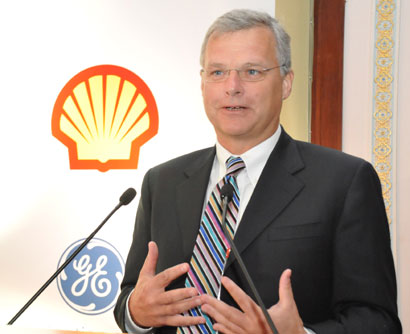Mark Carne, Executive Vice President, Middle East and North Africa, Shell Upstream International and Member of Royal Dutch Shell’s Upstream International Leadership Team, discussed the role of gas in securing an energy future for the Middle East region on December 12, 2011, at the Gas Arabia Summit.

Shell, a participant of the Gas Arabia Summit in Muscat, Oman, provided a detailed analysis on the future of energy in the Gulf. Coal emits twice as much of Carbon-Dioxide (CO2) than gas for power generation, resulting in gas being the cleanest burning fossil fuel. In the Middle East, there is an abundant supply of natural gas. The Gulf countries have an estimated 22 per cent of global natural gas reserves, making this the ideal region to invest in. According to the International Energy Agency, between 2008 and 2035 gas demand is expected to grow by 60% globally, 8 times in China, 5 times in India, and nearly 30% in North America. The need for gas in the Middle East will also continue to soar as these economies grow. At the Gas Arabia Summit, Carne stated that an estimated 60 million people are entering the Arab world workforce in the next decade. Increasing energy supplies will be essential to underpin their jobs and meet their lifestyle expectations. “Strong economic growth, population growth and increasing prosperity are driving up local gas demand even faster than the world average,” said Carne. “Many countries in the region are facing growing shortfalls in supply. And this is despite the high volumes of gas reserves in the region.” According to Carne, the region has substantial undeveloped natural gas resources. Stimulating exploration and production activities to make the most of those resources will benefit energy consumers and country economies alike. Arianna Neri, Conference Director, said: “Shell has invested significantly to understand the power requirements of the Middle East. According to Shell, global energy demand is estimated to triple by 2050. With reference to the Integrated Energy Strategy 2030 issued by the Dubai Supreme Council of Energy, Dubai aims to reduce energy imports and climate warming carbon dioxide emissions by 30 per cent by 2030, using its own solar power as well as nuclear power imported from Abu Dhabi. Furthermore, by 2030, Dubai plans to generate 71 per cent of its electricity supplies from gas, 12 per cent from coal, 12 per cent from nuclear that would be imported, mainly from Abu Dhabi, and 5 per cent from solar power.” As energy demand rises, Shell is placing a strong emphasis on developing its natural gas business. From 2012, gas will account for more than half of the company’s production. Shell prides itself in ensuring that gas is extracted and delivered economically, environmentally and in socially responsible ways. Carne, further continued: “Developing domestic resources in the region is not just about meeting demand. It offers significant additional value through taxes and royalties. And, given the scale of the social and demographic challenges facing the region, local gas development should also be recognized as an important source of local employment.” Carne who has a 20-year association with Shell, concluded his presentation saying: “By working together at a new level of strategic collaboration, government and industry can secure a sustainable energy future for the region through ensuring the supply chain to the gas industry is working effectively and able to generate jobs for the increasing number of young people.” The event was organized by The Energy Exchange and sponsored by Shell, Oman Gas Company, Oman LNG and Saudi Aramco.
MOST POPULAR IN LAST 24 HRS
MOST POPULAR IN LAST 7 DAYS
|